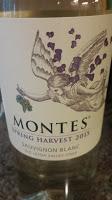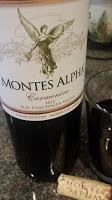 July's weekly #WineStudio chat focuses on the popular Chilean winery Viña Montes; specifically their sustainability program and their venture into Argentina with the Kaiken brand. Montes has been operating since 1988 (founded by Aurelio Montes, Douglas Murray, Alfredo Vidaurre, and Pedro Grand) and soon became the "benchmark for premium Chilean wines".
July's weekly #WineStudio chat focuses on the popular Chilean winery Viña Montes; specifically their sustainability program and their venture into Argentina with the Kaiken brand. Montes has been operating since 1988 (founded by Aurelio Montes, Douglas Murray, Alfredo Vidaurre, and Pedro Grand) and soon became the "benchmark for premium Chilean wines". Eventually the owners determined that a more sustainable farming approach was needed and designed a vineyard management program to satisfy this desire. The program consists of five primary goals or areas: Integrated Management, Maintaining Plant Cover, Less Water Use, Composting, and Use of Grazing Animals. The most discussed area was the winery's ability to decrease water consumption by dry farming - basically letting mother nature water the vines through rain instead of costly and energy intensive irrigation systems. Obviously, dry farming is most advantageous on soils with high water retention. Montes states that "we have decreased water consumption by 25% in Marchigüe and 10% in Apalta—a savings equivalent to the amount of water used by 3,200 families each year". An added bonus is that the lower yields more clearly express the terrior of the area as the vines dig ever deeper to find more sources of water.
Eventually the owners determined that a more sustainable farming approach was needed and designed a vineyard management program to satisfy this desire. The program consists of five primary goals or areas: Integrated Management, Maintaining Plant Cover, Less Water Use, Composting, and Use of Grazing Animals. The most discussed area was the winery's ability to decrease water consumption by dry farming - basically letting mother nature water the vines through rain instead of costly and energy intensive irrigation systems. Obviously, dry farming is most advantageous on soils with high water retention. Montes states that "we have decreased water consumption by 25% in Marchigüe and 10% in Apalta—a savings equivalent to the amount of water used by 3,200 families each year". An added bonus is that the lower yields more clearly express the terrior of the area as the vines dig ever deeper to find more sources of water. For the first part of this session we received two wines from Montes that represented the North-South axis of Chile. The Carmenère was grown on the above mentioned "Dry Farming" philosophy and includes a designation on the label.
Montes Spring Harvest Sauvignon Blanc 2015 ($14, 12.5%) - grapes harvested from the northern Leyda Valley, located just 8 kilometers from the Pacific, and area with abundant winter rainfall, with the vines planted in granite and clay soils. Because of judicious canopy management, the grapes were harvested in early spring, which in Chile translates to late February. The result is a fantastic wine, particularly for us acid lovers. There is abundant stone and tropical fruits, some mint and lemongrass, and plenty of acids.
Montes Alpha Carmenère 2012 ($20, 14.5%) - 90% of Carmenère & 10% Cabernet Sauvignon - grapes harvested from the El Arcángel Marchigüe estate, located at the western end of Colchagua Valley, in a more southern locale. The site is further east as well, 18 kilometers from the coast, with clay soils, and a cooler climate enabling later ripening. After fermenting, the wine was aged 12 months in French oak. My first suggestion is to decant. Then enjoy the cherry pepper aroma; dense, dusty, smoky blackberries and dark chocolate; and definite tannic finish. An excellent example of Carmenère.
